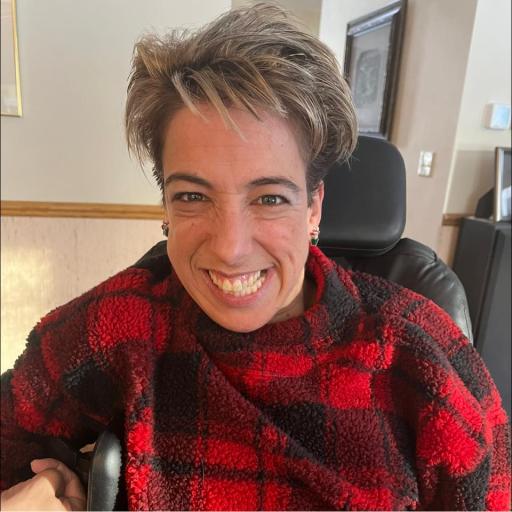
Stacy’s Journal: Secondary Effects
Unless a problem presents itself, most people don’t think about their medical well-being on a regular basis. Sure, people try to stay healthy by doing things such as eating right and exercising, but, unless something feels wrong with our bodies, we normally don’t think about what could go wrong or what we would want done if something catastrophic were to happen. People with disabilities are no different. Granted, we often have some extra baggage to deal with (cares, medications, accommodations, etc…), but most of the time, those things become second nature to us—we don’t even think about it
Some disabilities and health conditions are progressive which means the symptoms of the condition get worse as time passes and the effects are eventually terminal. Fortunately, cerebral palsy isn’t considered to be progressive. I’ve read in multiple articles that the average life expectancy for somebody who has cerebral palsy is around 70 years old. Although, cerebral palsy itself doesn’t get worse, people often develop secondary conditions due to cp. Research also points out that treatments used to help people who have cp sometimes can take a toll on the body eventually leading to premature death.
A few years ago, I wrote about how I was learning to navigate my way through the health care system. In that entry, I shared a little bit about how I had started having some health issues. In summer of 2012, I had a Baclofen pump surgically inserted which helps relax my muscles. Three weeks after that surgery, I had major emergency gastrointestinal surgery. Since then, I’ve had ongoing issues. I had another surgery in 2014 and have had a few hospital stays since. About three weeks ago, I had another emergency surgery and spent a few nights in the hospital. I had yet another gastrointestinal issue. Due to my past surgeries and the effects of cp, we found out that I’m unfortunately prone to having more of these types of issues and there really isn’t anything I can do to prevent it.
It’s often said that there isn’t enough focus on treating adults who have cerebral palsy. There is quite a bit of information about treatments and research to help children with cp, but there’s not much out there for adults. I’ve had many conversations with friends who also have cp, and many of them feel the same way—although we know cp isn’t progressive, we feel the effects of it impacting our lives more as we get older. I haven’t done much research lately, but I haven’t seen anything recent on how cp effects the aging process. It’d be interesting to see studies done on that.
Like everybody else, each time I go in for surgery, I have to answer those dreaded questions. What measures do you want taken to keep you alive? Do you want to be on life support? Questions such as those aren’t the easiest to answer especially when you’re headed into emergency surgery. I understand why the questions need to be asked, but, regardless of the situation, they are never easy to answer.
Often times, people, especially those with disabilities and health conditions, are encouraged to have a Power of Attorney of Healthcare on record at the medical facilities they use. The purpose of the medical POA is to give health care professionals guidance as to your wishes in case you’re ever in a medical condition where you’re incapable of making those decisions yourself. You can designate two or three people who you would want to make decisions for you and on the form you can answer specific questions about your preferences for sustainability. People should have the medical POA on record, but a licensed doctor must “activate” it if a situation arose. Ashamedly, I admit, I have yet to get mine on record. Every year, during one of my screenings for IRIS, I’m asked if I have one on record. I’ve had the paperwork printed out for three or four years. It’s just a matter of filling it out, getting signatures, and sending it to my medical providers. What’s the hold up, you ask? Well, aside from finding witnesses (they can’t be family members) to sign it, there’s a psychological aspect to it. It’s obviously a sensitive issue to begin with, but, for me, it brings up another issue. For most people my age, their next of kin or their designated person would be their significant other. Thankfully, I have great family who have agreed to be my designated people, but there’s something about putting it on record that just makes me feel hurt. I know I need to get it done though.
When I was young, I had no idea secondary health issues were common among people who have cp. Dealing with health issues definitely isn’t fun, but it’s part of my life and something I’ve learned to deal with. Having to make tough decisions about “what if” situations isn’t easy either, but I guess that’s called being an adult. While, at times it isn’t easy to do, I try not to let my issues get in the way and live life to the fullest. That’s all we can do, right?
***The views expressed here are strictly those of the author and do not necessarily reflect those of InControl Wisconsin, the Network or any of our sponsors.
